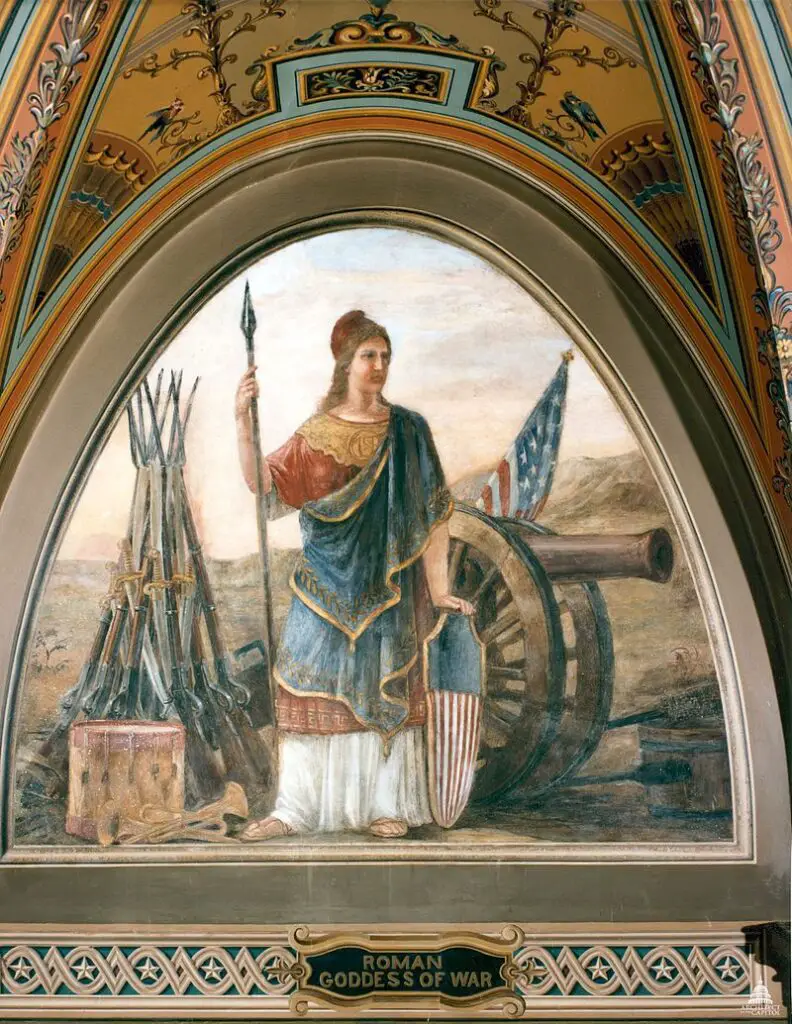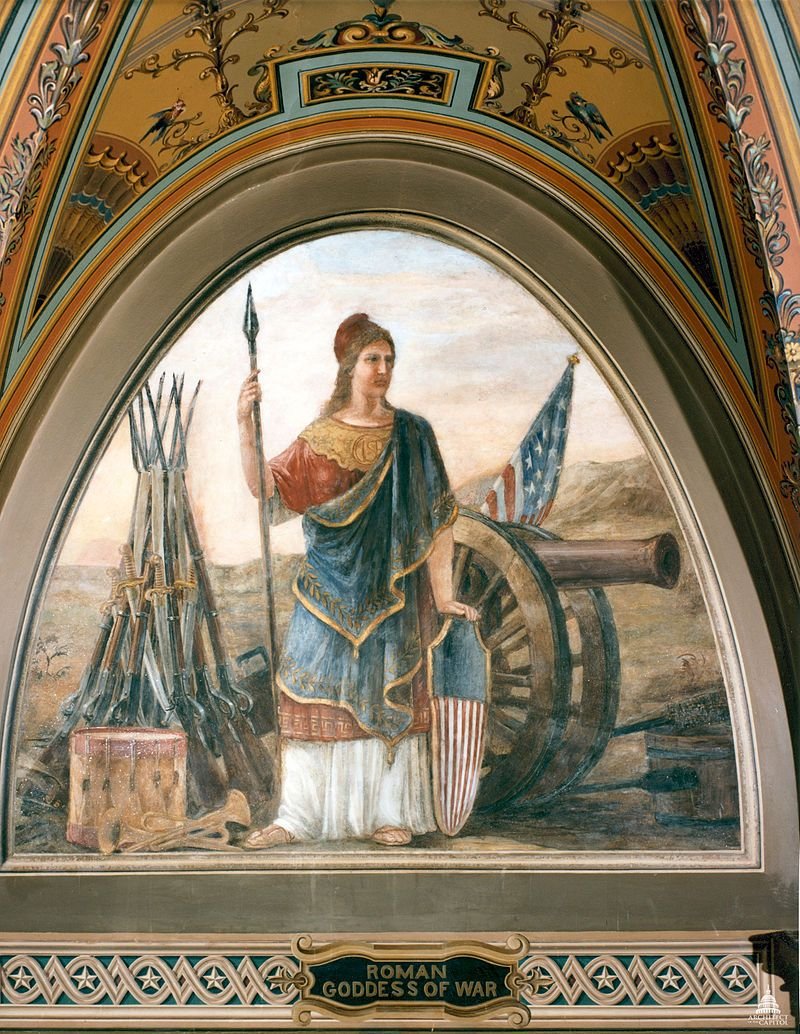
In the rich tapestry of Roman mythology, we encounter deities representing various aspects of life, from love and wisdom to the relentless force of war.
Among these formidable figures, Bellona, the Roman Goddess of War, emerges as a captivating and enigmatic presence.
In this article, we embark on a journey into the intriguing world of Bellona, where we explore her profound significance in Roman mythology, and her integral role in religious ceremonies, and unearth some lesser-known facets that enrich her story.
So, let’s venture back in time to acquaint ourselves with the formidable and multifaceted Bellona.
Who is Bellona Roman Goddess?
Bellona, the Roman goddess of war, was a powerful and active deity, not just an observer of battles.
Her name, derived from “bellum” meaning “war” in Latin, reflected her role in inciting warriors to battle and embracing the chaos of conflict.
She was depicted as a fierce commander, often portrayed wearing a helmet and wielding a sword.
Romans invoked her before battle, seeking her favor for victory.
Though her influence diminished over time, Bellona’s legacy as a symbol of martial power endured in Roman culture and mythology.
- Read also: Exploring the Timeless Power of Greek Fertility Goddesses
- Read also: Who Was Nyx in Greek Mythology
Bellona’s Role in Roman Mythology and Religion
Goddess of war
Bellona, the Roman goddess of war, occupied a central and revered position in Roman warfare.
She was not a passive figure but actively involved in the battlefield.
Roman generals and soldiers often called upon her before embarking on military campaigns, seeking her divine favor and guidance to secure victory in the brutal arena of war.
The Romans believed that invoking Bellona’s name would inspire them and ensure success in their conquests.
Symbolism
In artistic depictions, Bellona was portrayed with several significant symbols that embodied her association with the harsh realities of war.
One of her most recognizable symbols was a plumed helmet, a representation of her martial authority and leadership on the battlefield.
She also carried a shield, symbolizing protection and defense, essential elements in war strategy.
Another powerful symbol was her bloody scourge or whip, signifying the harsh discipline and brutality of combat.
Cult of Bellona
The Romans established a dedicated temple in honor of Bellona, aptly named the “Temple of Bellona.”
This sacred place served as a focal point for her worshippers, who gathered there to perform rituals and seek her divine blessings before setting out on military expeditions.
These ceremonies were an integral part of Roman military tradition, reflecting the profound reverence and importance given to Bellona by soldiers and commanders alike.
Influence on Roman Culture
Bellona’s significance extended far beyond the battlefield; her influence permeated various aspects of Roman culture and politics.
She was not solely invoked for success in warfare but also for guidance in broader matters such as decision-making and strategy.
Her presence in the political arena showcased the belief in her wisdom and the belief that her guidance extended beyond the realm of martial endeavors, underscoring her multifaceted role in Roman society.
- Read also: Who is Oshun Goddess? The Enchanting Goddess of Love
- Read also: A Look at the 10 Best Roman Emperors
Some Facts About Bellona Roman Goddess
Here are some interesting facts about Bellona, the Roman goddess:
- Bellona was the Roman goddess of war, often associated with Mars, the god of war. She represented the aspects of conflict, combat, and battle strategy in Roman mythology.
- She was often depicted with a helmet and a sword, symbolizing her martial attributes. Her appearance conveyed her fierce and warlike nature.
- Bellona was considered the sister or companion of Mars, and she played a crucial role in Roman military rituals and ceremonies. Her presence was believed to inspire Roman soldiers before they went into battle.
- Temples and shrines dedicated to Bellona were constructed in ancient Rome. Worshippers sought her blessings and protection for victorious military campaigns.
- In some myths, Bellona was portrayed as a daughter of Jupiter and Juno, making her one of the divine offspring in Roman mythology.
- The name “Bellona” is derived from the Latin word “bellum,” which means “war.” Her name reflects her primary domain and significance in Roman culture.
- Bellona’s influence extended beyond the battlefield; she was also invoked during times of civil unrest and conflict within the Roman Empire.
- Over time, Bellona’s cult waned in popularity, but she remained a symbol of martial power and the Roman approach to warfare.
- Bellona was often identified with the Greek goddess Enyo, who shared similar attributes as a goddess of war and destruction.
- Bellona’s worshippers included soldiers, military leaders, and even emperors, highlighting her importance in Roman society.
- The temple of Bellona in Rome housed a sacred stone known as the “Stone of War.” It was believed that striking this stone with a weapon would invoke the goddess’s favor in battle.
Conclusion
Bellona, the formidable Roman Goddess of War, exemplifies the intricate tapestry of Roman mythology.
Her pivotal role in matters of war, the reverence bestowed upon her in religious ceremonies, and her broader influence on culture all combine to create a vivid portrait of her significance in the Roman Empire.
Although her presence was most palpable on the battlefield, Bellona’s impact transcended those boundaries, leaving an indelible legacy in a civilization defined by its pursuit of power, conquest, and unwavering determination to claim victory.
FAQs
Yes, Bellona held a prominent place in Roman mythology, especially in the context of warfare, and was revered by many.
Bellona was often identified with the Greek goddess Enyo, who shared similar attributes as a goddess of war and destruction.
While many ancient Roman temples have been lost to time, some artifacts related to Bellona can still be found in museums, providing glimpses into her enduring legacy.


